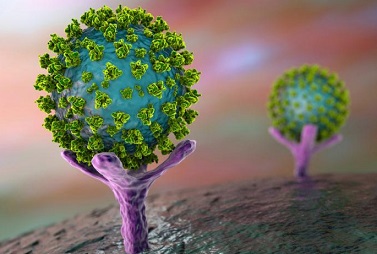COVID-19 News: Ukrainian Scientist Warns That The Alpha-7 Nicotinic Acetylcholine Receptors Are Responsible For Many Long COVID Manifestations!
Nikhil Prasad Fact checked by:Thailand Medical News Team Jan 16, 2024 2 years, 3 weeks, 2 days, 7 hours, 40 minutes ago
COVID-19 News: The global battle against COVID-19 has seen significant strides, with quarantines, vaccination campaigns, and antiviral measures successfully mitigating the spread and severity of acute infections. However, a lingering and perplexing aftermath, known as Long COVID or Post-Acute Sequelae of COVID-19 (PASC), has emerged as a formidable challenge. PASC presents a complex multi-organ syndrome, encompassing dysfunctions in the heart, lungs, kidneys, liver, spleen, pancreas, gastrointestinal tract, alongside cognitive impairment, fatigue, disordered sleep, and memory loss. As the scientific community grapples with understanding the nature of this persistent pathology, this
COVID-19 News repot aims to shed light on the pivotal role of cholinergic mechanisms, particularly α7 nicotinic acetylcholine receptors (α7 nAChRs), in both acute COVID-19 and the enigmatic long-term consequences based on a study by a researcher from the Palladin Institute of Biochemistry, Kyiv-Ukraine.
 SARS-CoV-2 Also Binds To The Alpha-7 Nicotinic Acetylcholine Receptors
SARS-CoV-2 Also Binds To The Alpha-7 Nicotinic Acetylcholine Receptors
As early as July 2020, Thailand
Medical News had also warned about SARS-CoV-2 ability to bind with the nicotine acetylcholine receptors.
https://www.thailandmedical.news/news/breaking-news-covid-19-research-shows-that-sars-cov-2-spike-proteins-also-targets-nicotine-acetycholine-receptors-in-human-host,-massive-alarming-impl
The α7 nAChRs and Neuroinflammation
Diving into the intricate world of nicotinic acetylcholine receptors, the α7 nAChRs emerge as crucial players. Initially identified as ligand-gated ion channels facilitating fast synaptic transmission in neuromuscular junctions and autonomic ganglia, these receptors have expanded their repertoire. They are now recognized for their presence in various non-excitable cells, influencing cell survival, adhesion, proliferation, and the release of neurotransmitters and cytokines. The α7 nAChRs, composed of α7 subunits, are ubiquitous, found not only in the brain and autonomic ganglia but also in mitochondria and cell nuclei outer membranes.
A noteworthy function of α7 nAChRs is their ability to modulate the release of pro-inflammatory cytokines, presenting a potential link to the inflammation observed in COVID-19. As the classical symptom of COVID-19 is hyperinflammation triggered by the notorious "cytokine storm," the anti-inflammatory role of α7 nAChRs becomes a focal point of investigation.
Direct Interaction of SARS-Cov-2 with α7 nAChRs
In the quest to unravel the intricacies of SARS-Cov-2's interaction with the human body, the spotlight has turned to the α7 nAChRs. The SARS(674-685)
peptide, a fragment of the SARS-Cov-2 spike protein, has emerged as a key player in this intricate interplay. Structural studies have revealed homology between this viral fragment and known antagonists of α7 nAChRs, including α-cobratoxin, α-bungarotoxin, and even the rabies virus, which penetrates cells through α7 nAChRs.
Electrophysiological experiments have delved into the dual nature of the SARS(674-685) peptide's impact on α7 nAChRs. While it activates these receptors in the presence of positive allosteric modulators, it paradoxically diminishes their channel activity elicited by acetylcholine, potentially due to competition for the acetylcholine-binding site. This dual effect suggests a nuanced relationship that could influence virus penetration into cells and the ensuing inflammatory response.
Further exploration has uncovered additional sites on the SARS-Cov-2 spike protein, such as the fragment 381-386, with homology to a sequence in a snake venom toxin. This expands the potential points of interaction between the virus and nicotinic receptors, adding layers to the complexity of the viral invasion.
In Vivo Effects of Antibodies Induced by SARS(674-685) Peptide
Turning to animal models, immunization studies with the SARS(674-685) peptide in mice have provided valuable insights into the potential consequences of viral fragments interacting with α7 nAChRs. Mice subjected to immunization displayed an inflammatory response and a substantial decrease in episodic memory – a cognitive impairment often observed in Long COVID patients.
Remarkably, interventions with choline, an α7 nAChR agonist, or hydroxyurea, an allosteric modulator, alleviated these effects. Analyses of brain tissues revealed decreased levels of α7 nAChRs in immunized mice, a deficit remedied by choline injections. Hydroxyurea injections, acting as a positive allosteric modulator, demonstrated a decrease in IL-1β levels in the brain, further emphasizing the potential therapeutic avenues presented by these agents.
The presence of specific antibodies in the blood of individuals who have experienced COVID-19, targeting both SARS(674-685) and α7(179-190), adds a layer of complexity to the immunological response. These findings suggest a potential link between these antibodies and the cognitive impairments observed in PASC, further highlighting the intricate relationship between the virus, the immune system, and the α7 nAChRs.
Implications for Therapeutic Interventions
Armed with these insights, therapeutic strategies for both acute COVID-19 and PASC begin to take shape. Stimulating α7 nAChRs with endogenous acetylcholine or exogenously added agonists and allosteric modulators emerges as a promising avenue for acute infection, potentially influencing virus penetration and mitigating inflammation.
However, the landscape becomes more intricate when addressing the prolonged consequences of COVID-19. The emergence of anti-idiotypic α7-specific antibodies, likely stimulated by SARS (674-685)-specific antibodies, introduces a self-sustaining loop with persistent pathogenic consequences. This prompts the exploration of more advanced therapeutic solutions.
α7-selective agonists, capable of activating receptors and potentially preventing antibody binding, emerge as a logical choice for therapeutic intervention.
Additionally, the use of protein-conjugated α7(179-190) could neutralize pathogenic antibodies, interrupting the detrimental idiotype-anti-idiotype loop.
Repurposed drugs, such as hydroxyurea, exhibiting positive allosteric modulation of α7 nAChRs, provide another avenue for exploration in PASC treatment.
Conclusion
As the world grapples with the enduring impact of Long COVID, the role of α7 nicotinic acetylcholine receptors emerges as a focal point of investigation. The intricate dance between SARS-Cov-2 and α7 nAChRs, involving viral fragments, antibodies, and potential therapeutic interventions, paints a complex picture of the pathogenesis and potential treatments for both acute COVID-19 and its persistent aftermath. As research progresses, targeting α7 nAChRs offers a promising avenue for unraveling the mysteries of Long COVID, providing hope for those navigating the enigmatic consequences of this global health crisis.
The study findings were published in the peer reviewed journal: The International Journal of Biochemistry & Cell Biology.
https://www.sciencedirect.com/science/article/abs/pii/S1357272524000104
For the latest
COVID-19 News, keep on logging to Thailand Medical News.
Read Also:
https://www.thailandmedical.news/news/covid-19-news-russian-study-finds-that-sars-cov-2-infections-can-cause-cholinergic-deficiency-leading-to-various-serious-health-conditions
